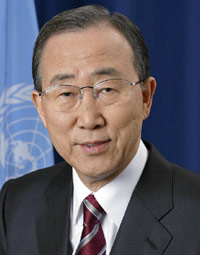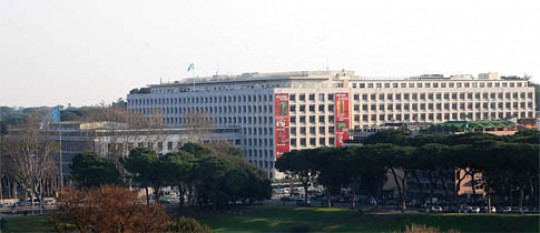UN officials urge concerted effort to achieve global food security
UN officials urge concerted effort to achieve global food security
United Nations officials today called for concerted efforts to ensure the world’s fast-growing population has enough food, stressing that global food production will have to double by 2050 when the planet is expected to host an additional one billion inhabitants.
Secretary-General Ban Ki-moon stressed that guaranteeing sustainable food and nutrition security for all will require the full engagement of governments and the private sector.
“It means pursuing comprehensive approaches – assisting the most vulnerable, listening to rural women, empowering small producers,” Mr. Ban said during an event in New York to commemorate the 31st anniversary of the observance of World Food Day, which is marked on 16 October every year.
“It means strong political commitment, predictable finance, and a focus on results. We have the resources and the knowledge to end hunger. We know how to protect the poorest from the impact of rising prices.”
The President of the General Assembly, Nassir Abdulaziz Al-Nasser, noted that targeted safety nets and social programmes are essential for alleviating hunger and poverty in the short term, but a strong foundation for development must be laid to ensure sustainable food security.
“Granting market access for agricultural products from developing countries will help in this respect,” said Mr. Al-Nasser. “Small and medium-sized farmers should be supported through increased resource allocation in rural infrastructure and agricultural services.
“Over the longer-term, a food-security strategy that relies on a combination of boosting local production and productivity and a general increased role for trade will help to reduce price volatility, while improving food availability and accessibility,” he added.
Mr. Ban said he was encouraged by the renewed political interest in food security, including the prominence that is being given to the issue by the Group of 20 (G-20) of the world’s largest economies.
###
27 October 2011, New York
Secretary-General’s remarks at World Food Day Commemoration
H.E Mr. Nassir Abdulaziz Al-Nasser, President of the General Assembly, H.E Mr. Lazarous Kapambwe, President of the Economic and Social Council, Mr. Jacques Diouf, Director-General of FAO, Mr. Kanayo F. Nwanze, President of IFAD, Ms. Josette Sheeran, Executive Director of WFP, Ms. Barbara Stocking, Chief Executive of OXFAM, Ms. Dee Dee Bridgewater, FAO Goodwill Ambassador, Excellencies, Ladies and gentlemen,
This year’s observance of World Food Day falls at a time when the Horn of Africa is living through its worst drought in 60 years.
The worst effects have been limited to areas in southern Somalia that lie outside the reach of most emergency relief.
Elsewhere, the situation is still critical.
Land, livestock, food and seeds have been badly depleted.
The most dangerous stretch may still lie ahead.
But this is unlike previous catastrophic droughts when famine stalked the entire region.
The affected governments, with support from development partners, have worked hard to build resilience.
Their efforts have saved lives.
They have helped local communities to meet many of their own needs.
This crisis has shown that measures to guarantee food security work.
They reduce human suffering and the cost of emergency interventions.
They can help communities to withstand future climate- and conflict-related shocks.
They point the way toward long-term solutions.
Ladies and gentlemen,
The hunger in the Horn of Africa is but a fraction of a needless global menace.
There is more than enough food on the planet to feed everyone.
Yet, almost one billion people are hungry.
This year’s World Food Day highlights the issue of high and volatile food prices.
When food prices surge, poor families suddenly find themselves unable to afford enough nutritious food.
If this happens during the first thousand days of a child’s life, the damage to his or her body and mind can be permanent.
When food prices rise, families send their children to work instead of school, they sell their hard-earned assets or livestock? or they go into debt.
Recovery can take years. In some cases, the losses are passed from one generation to the next.
This week the human family will welcome its seven billionth member.
By 2050, we will number nine billion.
To keep pace, food production will need to double.
The wild price swings of recent years, together with the expected impacts of climate change, will make this extremely challenging.
Farmers could well find it too risky to invest in producing more, better quality food.
Guaranteeing sustainable food and nutrition security for all will require the full engagement of many sectors and actors.
It means pursuing comprehensive approaches? assisting the most vulnerable? listening to rural women? empowering small producers.
It means policies like those advocated by the Scale Up Nutrition movement.
It means strong political commitment? predictable finance? and a focus on results.
Ladies and gentlemen,
We should all be encouraged by the renewed political interest in food security, including the prominence that it was given by the G20 this year.
Let us endeavour to build on this momentum – especially as we look forward to the crucially important Rio+20 conference on sustainable development.
We have the resources and the knowledge to end hunger.
We know how to protect the poorest from the impact of rising prices.
We know how to tame volatile prices.
Every child, woman and man has a right to enough nutritious food for an active and healthy life.
Let us act – now.
###

Ban Ki-moon
Secretary-General of the United Nations.
Ban Ki-moon is the eighth Secretary-General of the United Nations. His priorities have been to mobilize world leaders around a set of new global challenges, from climate change and economic upheaval to pandemics and increasing pressures involving food, energy and water. He has sought to be a bridge-builder, to give voice to the world’s poorest and most vulnerable people, and to strengthen the Organization itself.“I grew up in war”, the Secretary-General has said, “and saw the United Nations help my country to recover and rebuild. That experience was a big part of what led me to pursue a career in public service. As Secretary-General, I am determined to see this Organization deliver tangible, meaningful results that advance peace, development and human rights.”Mr. Ban took office on 1 January 2007. Highlights of his tenure have included:
Promoting sustainable development
One of the Secretary-General’s first major initiatives was the 2007 Climate Change Summit, followed by extensive diplomatic efforts that have helped put the issue at the forefront of the global agenda. Subsequent efforts to focus on the world’s main anti-poverty targets, the Millennium Development Goals, have generated more than $60 billion in pledges, with a special emphasis on Africa and the new Global Strategy on Women’s and Children’s Health. At the height of the food, energy and economic crises in 2008, the Secretary-General successfully appealed to the G20 for a $1 trillion financing package for developing countries and took other steps to guide the international response and protect the vulnerable and poor.
Empowering women
The Secretary-General pressed successfully for the creation of UN Women, a major new agency that consolidates the UN’s work in this area. His advocacy for women’s rights and gender equality has also included the “Unite to End Violence against Women” campaign, the “Stop Rape Now” initiative, the creation of a “Network of Men Leaders” and the establishment of a new Special Representative on Sexual Violence in Conflict. Within the UN itself, the Secretary-General has increased the number of women in senior management positions by more than 40 per cent, reaching the highest level in the Organization’s history.
Supporting countries facing crisis or instability
The Secretary-General has sought to strengthen UN peace efforts, including through the New Horizons peacekeeping initiative, the Global Field Support Strategy and the Civilian Capacity Review, a package of steps to improve the impact of the 120,000 United Nations “blue helmets” operating in the world’s conflict zones. A mediation support unit, along with new capacity to carry out the Secretary-General’s good offices, have been set up to help prevent, manage and resolve tensions, conflicts and crises. Accountability for violations of human rights has received high-level attention through inquiries related to Gaza, Guinea, Pakistan and Sri Lanka, legal processes in Lebanon and Cambodia, and advocacy for the “responsibility to protect,” the new United Nations norm aimed at prevent and halt genocide and other grave crimes. He has also sought to strengthen humanitarian response in the aftermath of mega-disasters in Myanmar (2008), Haiti (2010) and Pakistan (2010), and mobilized UN support for the democratic transitions in North Africa and the Middle East.
Generating new momentum on disarmament, arms control and non-proliferation
The Secretary-General has sought to rejuvenate the disarmament agenda through a five-point plan, efforts to break the deadlock at the Conference on Disarmament and renewed attention to nuclear safety and security in the aftermath of the tragedy at the Fukushima Daiichi Nuclear Power Plant.
Strengthening the UN
The Secretary-Generalhas introduced new measures aimed at making the United Nations more transparent, effective and efficient. These include heightened financial disclosure requirements, compacts with senior managers, harmonization of business practices and conditions of service, the adoption of International Public Sector Accounting Standards, and continued investments in information technology and staff development.
Personal
The Secretary-General was born in the Republic of Korea on 13 June 1944. He received a bachelor’s degree in international relations from Seoul National University in 1970. In 1985, he earned a master’s degree in public administration from the Kennedy School of Government at Harvard University.At the time of his election as Secretary-General, Mr. Ban was his country’s Minister of Foreign Affairs and Trade. His 37 years of service with the Ministry included postings in New Delhi, Washington D.C. and Vienna, and responsibility for a variety of portfolios, including Foreign Policy Adviser to the President, Chief National Security Adviser to the President, Deputy Minister for Policy Planning and Director-General of American Affairs.Mr. Ban’s ties to the United Nations date back to 1975, when he worked for the Foreign Ministry’s United Nations Division. That work expanded over the years, with assignments that included service as Chairman of the Preparatory Commission for the Comprehensive Nuclear Test Ban Treaty Organization and Chef de Cabinet during the Republic of Korea’s 2001-2002 presidency of the UN General Assembly. Mr. Ban has also been actively involved in issues relating to inter-Korean relations.The Secretary-General speaks English, French and Korean. He and his wife, Madam Yoo (Ban) Soon-taek, whom he met in high school in 1962, have one son, two daughters and three grandchildren. Since 2007, Mrs. Ban has devoted her attention to women’s and children’s health, including autism, the elimination of violence against women, and the campaign to prevent mother-to-child transmission of HIV/AIDS.
###
> UN Food and Agriculture Organization (FAO).
The Food and Agriculture Organization of the United Nations (FAO) is an intergovernmental organization and has 191 Member Nations, two associate members and one member organization, the European Union. Achieving food security for all is at the heart of FAO’s efforts – to make sure people have regular access to enough high-quality food to lead active, healthy lives.

FAO’s mandate is to raise levels of nutrition, improve agricultural productivity, better the lives of rural populations and contribute to the growth of the world economy.
The Food and Agriculture Organization of the United Nations (FAO) is working with its Members and the entire international community for achievement of the Millennium Development Goals.
These eight goals – each with specific targets and indicators – are based on the United Nations Millennium Declaration, signed by world leaders in September 2000. They commit the international community to combating poverty, hunger, disease, illiteracy, environmental degradation, and discrimination against women.
![]()
The eight Millennium Development Goals are:
Goal 1: Eradicate extreme poverty and hunger
Goal 2: Achieve universal primary education
Goal 3: Promote gender equality and empower women
Goal 4: Reduce child mortality
Goal 5: Improve maternal health
Goal 6: Combat HIV/AIDS, malaria and other diseases
Goal 7: Ensure environmental sustainability
Goal 8: Develop a Global Partnership for Development
* More information at UN Food and Agriculture Organization (FAO)
###
> United Nations (UN).
 The United Nations was established on 24 October 1945 by 51 countries committed to preserving peace through international cooperation and collective security. Today, nearly every nation in the world belongs to the UN: membership totals 192 countries.
The United Nations was established on 24 October 1945 by 51 countries committed to preserving peace through international cooperation and collective security. Today, nearly every nation in the world belongs to the UN: membership totals 192 countries.
When States become Members of the United Nations, they agree to accept the obligations of the UN Charter, an international treaty that sets out basic principles of international relations. According to the Charter, the UN has four purposes:
- to maintain international peace and security;
- to develop friendly relations among nations;
- to cooperate in solving international problems and in promoting respect for human rights;
- and to be a centre for harmonizing the actions of nations.
###
* The above story is adapted from materials provided by United Nations (UN)
** More information at United Nations (UN)






















